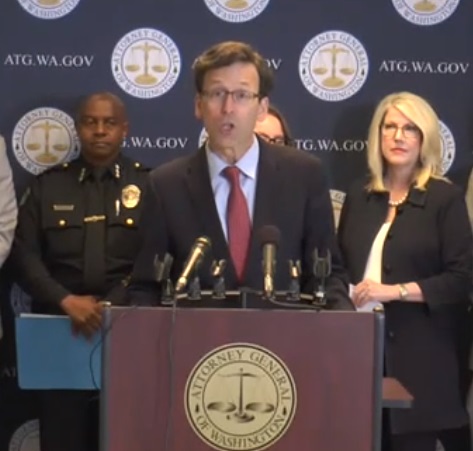
OLYMPIA, WA – A 10-person Organized Retail Crime Unit is now being funded to coordinate, investigate, and prosecute multi-jurisdictional retail crime across Washington State. Attorney General Bob Ferguson announced today that the Legislature fully funded his request to create the centralized unit to go after groups of individuals that steal products in order to resell them for a profit. This does not include petty theft, shoplifting, or poverty-driven crimes.
Ferguson originally convened the unit last June. He says an analysis from the Retail Industry Leaders Association estimates Washington retailers lost $2.7 billion to organized retail crime in 2021. Nationally, that amount of retail losses is around $70 billion.
Federal crime statistics show that the value of items stolen from Washington retailers increased by 151% from 2019 to 2020.
The unit will include investigators, prosecutors, and a data analyst. They will be able to assist with investigations — including coordinating them across multiple jurisdictions — and deploy resources where they are most needed. The unit will also be able to prosecute cases referred to the office by county prosecutors.
“These are not petty thefts,” Ferguson says. “These are multi-jurisdictional, organized crime rings that endanger the safety of employees and customers, damage our economy, and drive up costs for all Washingtonians. This centralized, statewide unit will serve as a force multiplier to combat these sophisticated crimes and hold the perpetrators accountable. I look forward to working with the task force to maximize the effectiveness of this Unit.”
From AG’s Office:
The need for a centralized unit and more investigative and prosecutorial resources was identified by Ferguson’s Organized Retail Crimes Task Force, which convened in 2022. The Task Force includes representatives from state, local, and federal law enforcement, small and large businesses, and retail workers.
Ferguson’s funding request brought together both business and workers. The funding, which begins on July 1, will allow the Task Force to continue.
“I applaud the Attorney General for creating the Organized Retail Crime Unit,” said Bellevue Police Chief Wendell Shirley. “It’s precisely the proactive and focused statewide approach we need to combat this ongoing problem.”
“As the retail industry continues to recover from the pandemic, there has never been a more critical time in Washington state to address the growing impacts of organized retail crime on public safety and the safety of our customers and retail employees,” said Renée Sunde, president and CEO of the Washington Retail Association. “Funding the unit is an important part of a multi-pronged approach to coordinate the efforts of state and local law enforcement, prosecutors, retailers and policymakers at multiple agencies and levels of government.”
“Organized retail crime harms workers in communities across our state,” said Faye Guenther, president of United Food and Commercial Workers 3000. “A centralized unit in the Attorney General’s Office focused on combating this problem will improve the lives of Washingtonians.”
UFCW 3000 is the largest UFCW local union in the country with over 50,000 members working in grocery, retail, health care, meat packing, cannabis & other industries across Washington state, northeast Oregon and northern Idaho.
“Organized crime has been a growing concern in communities like Issaquah,” Issaquah Mayor Mary Lou Pauly said. “Through talks with other municipalities and jurisdictions, it’s clear to me that the Organized Retail Crime Unit can do more good than individual agencies can on their own. We owe it to our community members to solve this complicated problem with greater coordination and dedicated resources.”
Chief Shirley, Mayor Pauly, Sunde and Guenther all participate in Ferguson’s task force.
“Organized retail theft harms our businesses and damages our sense of safety and community,” said Rep. Bill Ramos, D-Issaquah, the chair of the House State Government & Tribal Relations Committee. “I am pleased that our budget this year included funding for an organized retail crime unit in the Attorney General’s Office. Due to the multi-jurisdictional nature of this crime, it is difficult for local law enforcement to investigate and prosecute. This new unit will be able to coordinate with law enforcement across the state and work to combat this organized criminal activity.”

